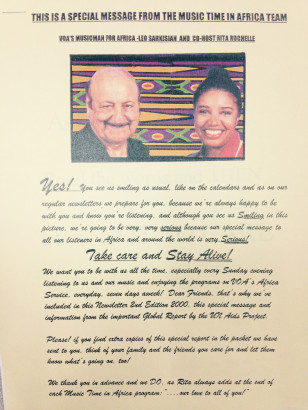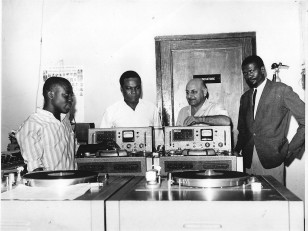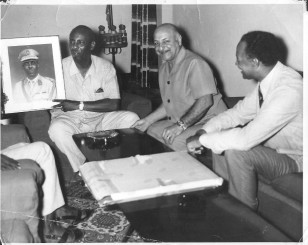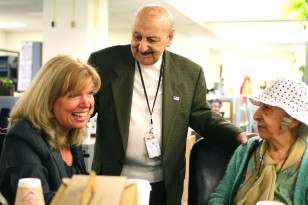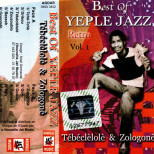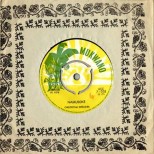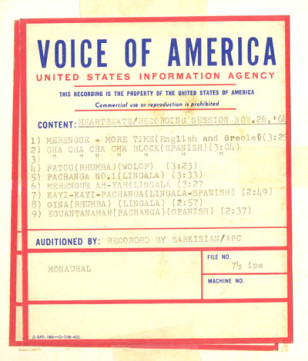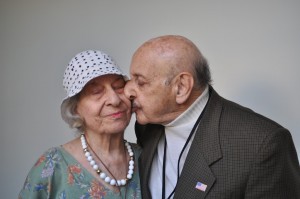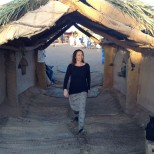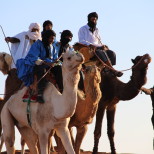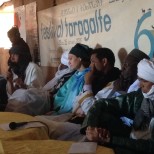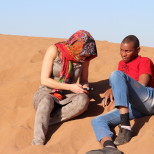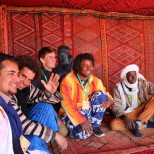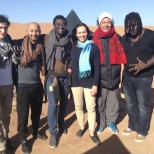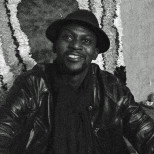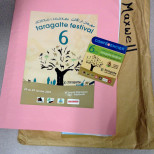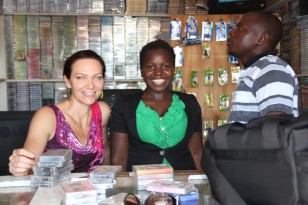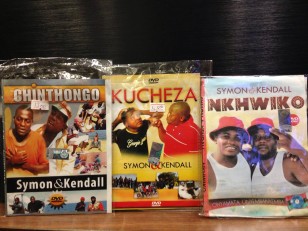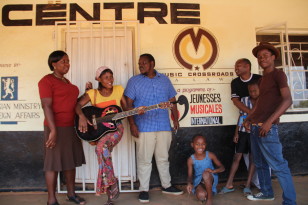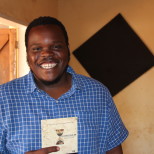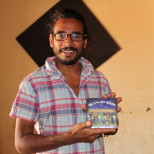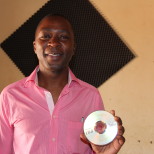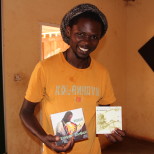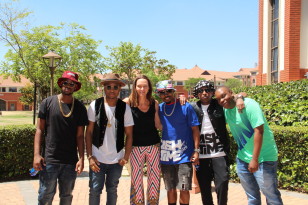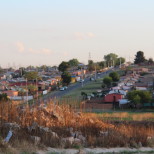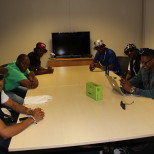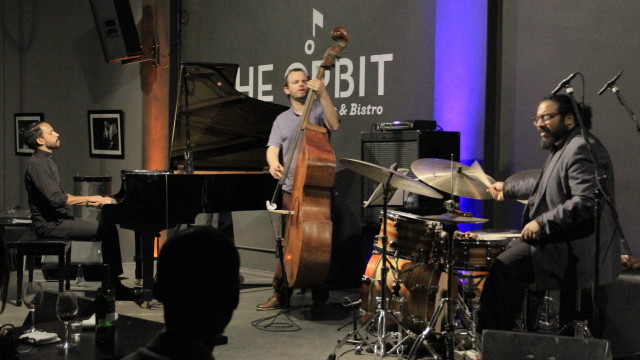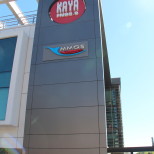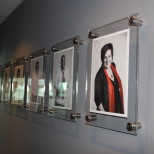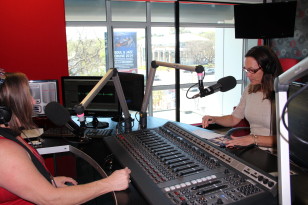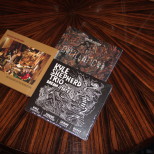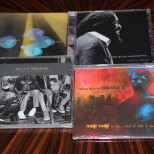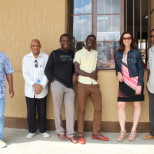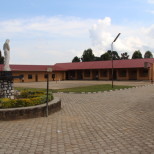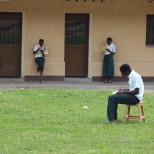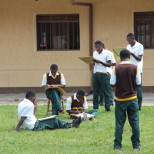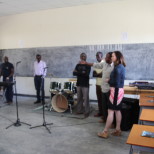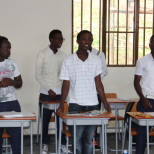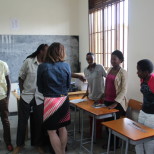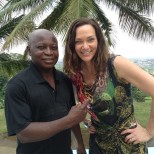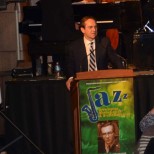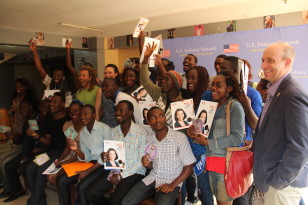 Last June I visited Cameroon for the first time. My eight-day mission was twofold: Introduce new audiences to Music Time in Africa and other VOA African music programs, and share my brand of American vocal jazz with Cameroonians.
Last June I visited Cameroon for the first time. My eight-day mission was twofold: Introduce new audiences to Music Time in Africa and other VOA African music programs, and share my brand of American vocal jazz with Cameroonians. 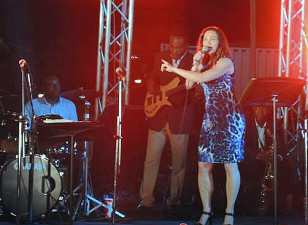 Highlights of my performances and workshops were well documented by the Cultural Affairs Office of the U.S. Embassy in Yaounde and local newspaper and radio stations. Yet the amazing display of musical talent and diversity that had unfolded before me each and every day, was robbed of its own deserved time to shine. In all of the hustle and bustle of returning back to my regular tempo of life and scheduled programs in Washington DC, most of my documentation of the Cameroon tour got placed on hold. So now’s the time to bring back to life my best photos, video, and music from the world of Cameroonian music as I lived it, even if only too briefly.
Highlights of my performances and workshops were well documented by the Cultural Affairs Office of the U.S. Embassy in Yaounde and local newspaper and radio stations. Yet the amazing display of musical talent and diversity that had unfolded before me each and every day, was robbed of its own deserved time to shine. In all of the hustle and bustle of returning back to my regular tempo of life and scheduled programs in Washington DC, most of my documentation of the Cameroon tour got placed on hold. So now’s the time to bring back to life my best photos, video, and music from the world of Cameroonian music as I lived it, even if only too briefly.
The thing that struck me the most about music in Cameroon was its spectacular diversity. After only eight days in two different cities, French-speaking Yaounde and English-speaking Buea, the music I encountered seemed to encompass all of sub-Saharan Africa. Cameroonians are aware of this too, as I was proudly told me time and time again “We have everything in Cameroon!”
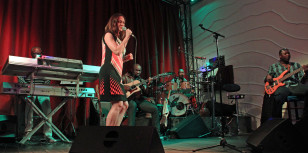 Yaounde Jazz: My first scheduled performance in Yaounde was a short jazz set with a local quartet: keyboard, drums, bass, guitar. The gig was at a swank cabaret called Yao Bà. I forgot to take note of the names of the members of the quartet, unfortunately, so cannot identify them here, but they were tight. I arrived with my U.S. Embassy crew when they were already playing so we didn’t even get the chance to talk through a song list, keys, or arrangements. I took the stage, said Bonjour, and called the song and key to the first song, “All of Me” – G Major. Without delay, the guys just took it away with a nice intro that set me up nicely. Pas de problème. If I’d closed my eyes and listened to that performance, I could have guessed that those musicians were from anywhere in the world where jazz rules: Paris, New York, or Washington DC. That night I also met Manuel Wandji, a Franco-Cameroonian, world music artist who would be assisting me in Yaounde. Affectionately know as Wambo in Cameroon, Manuel made a smash hit with his song “C’est pas Facile” in 2005.
Yaounde Jazz: My first scheduled performance in Yaounde was a short jazz set with a local quartet: keyboard, drums, bass, guitar. The gig was at a swank cabaret called Yao Bà. I forgot to take note of the names of the members of the quartet, unfortunately, so cannot identify them here, but they were tight. I arrived with my U.S. Embassy crew when they were already playing so we didn’t even get the chance to talk through a song list, keys, or arrangements. I took the stage, said Bonjour, and called the song and key to the first song, “All of Me” – G Major. Without delay, the guys just took it away with a nice intro that set me up nicely. Pas de problème. If I’d closed my eyes and listened to that performance, I could have guessed that those musicians were from anywhere in the world where jazz rules: Paris, New York, or Washington DC. That night I also met Manuel Wandji, a Franco-Cameroonian, world music artist who would be assisting me in Yaounde. Affectionately know as Wambo in Cameroon, Manuel made a smash hit with his song “C’est pas Facile” in 2005.
The lyrics to “C’est pas Facile” struck a chord in the hearts of Cameroonians. They tell a sad truth (life is hard) yet offer hope in strength and goodness of friendship. It opens with “Often I tell myself, money’s not the only thing that can make me happy.” It goes on, “Too often I see friends ruin their friendship over a nice car, jewelry, or shoes. That is so gaou (loser)! If you’re not doing well tomorrow, you’ll be alone like an old macabo (Cameroonian fufu) . If you’re doing well, remember that a friend is the best gift ever.” The refrain, which is sung many times, sings “Give your heart in friendship, life isn’t easy. Know how to love without jealousy, oh, life isn’t easy.
Forgive and forget, my friend, life isn’t easy.” In the final refrain, Wambo changes the lyrics to invoke a positive national identity “We stick together! Listen, that is Cameroon: Solidarity!
Solidarity is not eating alone, solidarity is not eating and cruising alone.”
From Gospel to Hip Hop: On Tuesday I met some thirty local music professionals and artists at the Solomon Tande Muna Foundation. 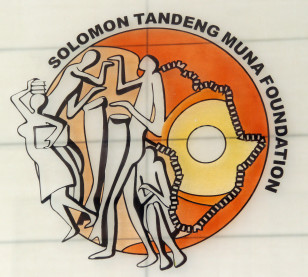 I spoke about VOA’s African music programs and then, many of the artists performed for me live and sought feedback and advice on how to improve their sound, make it marketable and radio-ready. Several gave me copies of their CDs and DVDs. Among them were rappers, one reggae duo from Cote d’Ivoire, singer songwriters, one gospel singer, House DJs, and Afro pop artists. I was astonished at the diversity not only in music style and level of artistry, but in age as well.
I spoke about VOA’s African music programs and then, many of the artists performed for me live and sought feedback and advice on how to improve their sound, make it marketable and radio-ready. Several gave me copies of their CDs and DVDs. Among them were rappers, one reggae duo from Cote d’Ivoire, singer songwriters, one gospel singer, House DJs, and Afro pop artists. I was astonished at the diversity not only in music style and level of artistry, but in age as well. 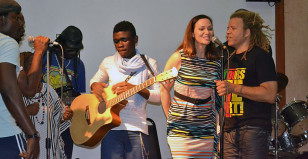 Pictured below is a jam session at Muna with several of the participants and Manual Wandji (far right).
Pictured below is a jam session at Muna with several of the participants and Manual Wandji (far right).
A HipHop star named Big Joe, for example, gave me his single “Tchop et Yamo” which had just blown up all over the Cameroonian airwaves a few months before.
Since last year, Big Joe released a second single “Sirri Bi” and is working toward funding to make his first music video. In a recent phone interview, he explained the messages behind his songs. Both celebrate Cameroonian culture in food and hometown beauties. Listen to “Sirri Bi” on the link below or to the full interview featured on this Music Time in Africa radio show.
Aunty Clo was another colorful artist I met at the Muna Foundation. 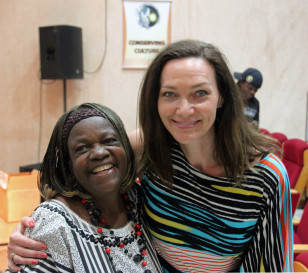 She gave me a DVD of her hit gospel song “Africa, Arise and Shine”. Included in the DVD packaging are the lyrics taken from the Christian scripture of Isaiah 60: 1-16 “adopted for Africa” on 12/21/2009.
She gave me a DVD of her hit gospel song “Africa, Arise and Shine”. Included in the DVD packaging are the lyrics taken from the Christian scripture of Isaiah 60: 1-16 “adopted for Africa” on 12/21/2009.
Neo-soul singer songwriter Danielle Eog Makedah performed one song and presented me with her full CD Peace, Love & Light. Here’s track 1 “Dry My Tears.”
On Wednesday, now day 3 of my sejour in Cameroon, I made a 7:30 a.m. appearance on the daily TV show “Hello!”, a live entertainment TV program on the state-owned Cameroon Radio and Television (CRTV). 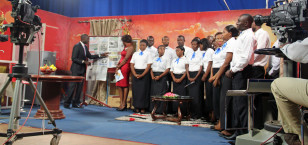 The show’s audience is around 100,000 viewers all over Cameroon, primarily Anglophone working-class adults. The show is a one-stop wonder of weather and news reporting, live infomercials, music entertainment and more. To the right is the news reporter (left) with the host, reading the news to Hello!’s audiences from the daily paper posted on the bulletin board and an acapella gospel choir awaiting their cue to perform. The choir was phenomenal. As “Hello!” is not scripted, we were invited to perform something together while the cameras were rolling.
The show’s audience is around 100,000 viewers all over Cameroon, primarily Anglophone working-class adults. The show is a one-stop wonder of weather and news reporting, live infomercials, music entertainment and more. To the right is the news reporter (left) with the host, reading the news to Hello!’s audiences from the daily paper posted on the bulletin board and an acapella gospel choir awaiting their cue to perform. The choir was phenomenal. As “Hello!” is not scripted, we were invited to perform something together while the cameras were rolling. 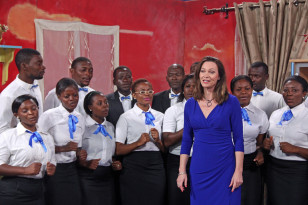 I believe this song was “Amazing Grace.” The choir sang in flawless 4-part harmony.
I believe this song was “Amazing Grace.” The choir sang in flawless 4-part harmony. 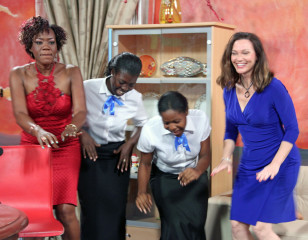 The singers moved in a loosely choreographed style that added a beautiful visual component to the sound. At the conclusion of our collaboration, the women enticed me (and the show host) to try and match their moves. Amazing Grace has never felt so amazing as it did on the set of “Hello!” in Yaounde.
The singers moved in a loosely choreographed style that added a beautiful visual component to the sound. At the conclusion of our collaboration, the women enticed me (and the show host) to try and match their moves. Amazing Grace has never felt so amazing as it did on the set of “Hello!” in Yaounde.
Later that day I met an assemblage of some thirty student members of dance and music groups at the University of Yaounde 1. Manuel Wandji was with me who hadn’t stopped drawing crowds of excited fans since he joined me on Monday night. The students straggled in one by one and appeared to be most drawn toward the snacks and cold drinks at first. Manuel’s presence and the gradual realization that I was from the Voice of America eventually captured their attention. After the formal introductions, Manuel and I talked about singing and performed for them. They politely listened, but really started to show some energy once they started singing for us. Here is some video of this afternoon I put together. It shows the progression of their performance for us, beginning from their somewhat sleepy delivery of traditional choral songs to their more popular numbers with an electric band. The band must have gotten wind that Manuel would to be there because, among the popular tunes they did, they played “C’est Pas Facile.” The clip also shows Manuel joining the band on congas followed by a brief lesson with the drum student on the correct, original rhythm to the song.
During the workshop after this performance, the students expressed frustration at the lack of quality instruments and music instruction. None of them were studying music seriously or as a primary academic subject rather, they just get together and play informally when they have time. They perform concerts four to five times a year.
The Mvet: Thursday morning Manuel had arranged an interview with Pantaleon, the uncontested king of mvet. The mvet is a traditional 10-string instrument indigenous to the Eton people from the Central Region of Cameroon. Pantaleon had made the trip on motorcycle from his home in the village of Lekie. We met at the poolside of Mt. Febe Hotel where I was staying and with the help of Manuel’s camera skills we were able to capture Pantaleon’s presentation and performance. I have made this clip of that magical moment and translated the French with English subtitles. Watch and enjoy the music and stay tuned to the end of the clip if you want to learn about the mechanics of the construction and tuning of the mvet.
I have only presented four of my eight days of music in Cameroon but this post ends here. Stay tuned for Part 2 of this series where I’ll share my experiences in Buea, the capital of the English-speaking Southwest Region, and more from Yaounde.

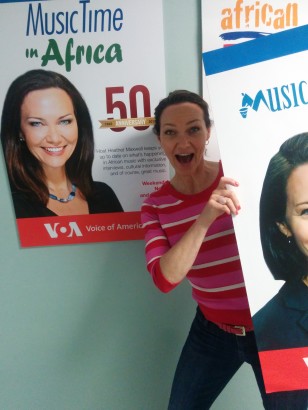
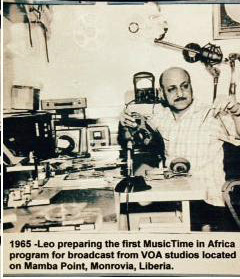 The 30- minute, hosted radio show presented African music across the African continent in the English language.The program’s creator was
The 30- minute, hosted radio show presented African music across the African continent in the English language.The program’s creator was 